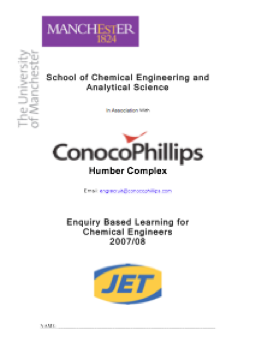Enquiry Based Learning
Chemical Engineering - CHEN 20014


Problem Based Learning
--
I ran the EBL course for 12 months - January 2007 - 2008, for the First year undergraduate students in Chemical Engineering and Analytical Science.
The following was taken from the course booklet, introduction section.
----
What is Enquiry Based Learning?
A major component of the current curriculum in Chemical Engineering is the development of team-based learning activities and the reinforcement that all the skills you learn throughout this degree course are equally applicable to all areas of both Chemical Engineering and also to life in general.
As such we have introduced the Enquiry Based Learning (also know as Problem Based Learning), which we have used to replace the traditional tutorial sessions.
In these sessions, you will tackle a series of questions, some relating to Chemical Engineering, and some applying your knowledge of Chemical Engineering and science in general to real-world problems.
This course contains questions encompassing a wide range of Chemical Engineering subjects, and have been drawn form the various course modules you are currently studying, some of which are more prevalent in the second semester.
As such, you can expect questions covering topics such as: -
- Engineering Mathematics - Methods for Chemical Engineering.
- Engineering Chemistry - Physical chemistry, thermodynamics and chemical reaction engineering.
- Engineering Design - Material and Energy balances, and Equipment Design.
- Transport phenomena - Heat Transfer and Fluid Mechanics.
On the whole, you will not be expected to answer question on subject specific areas which have not yet been covered in lecture sessions, however on those rare occasions when this happens, we would ask that you apply common sense to the problems and make an attempt. Often it is a learning experience in itself, and attempting questions before the lecture sessions is often encouraged as this helps you to gain an understanding of the working. Do not worry if you do not get the right answer. In some cases there is no “right” answer, and in others the methodology of applying a variety of skills to the task is far more rewarding and useful than obtaining the “correct” answer.
As with a lot of things in life, its not so much what you do, as how you do it.
Additional Information - Problem Based Learning (PBL)
Problem-based learning (PBL) introduces the concept of professional team-working. Each team of around 10 - 12 students is given a description of a problem that requires an engineering solution. Although parts of the solution may be familiar to you, new material will need to be discovered and learnt in order to present a complete answer. As part of a team you will identify the new material, look for books and articles that will explain it, discuss your new understanding and finally put together a solution.
As in a real problem, what is learnt is under the control of the team, and the path by which learning is accomplished may vary from team to team. However, a well-structured problem will allow you to teach yourself the core material of the subject and to understand how it may be applied and extended. PBL units will be assessed by a combination of a mark for the work produced by the team and marks awarded for more traditional forms of assessment.
Problem-based learning is designed to help you to develop skills that will make you more valued by your future employers. It should enable you to improve your problem solving and communication abilities, which are seen as keys to the world of employment in the 21st century. It will also help to keep our graduates at the front of new developments throughout their lives.
Problem Based Learning’ (PBL) has been introduced to selected units. With PBL, students study problems in small groups and identify their own learning objectives in order to address each problem.
In this way students can direct their own learning and choose the learning resources required (e.g. books, IT resources, course notes, lectures, experiments, etc). This approach gives many benefits to the learning process, while still delivering the learning outcomes achieved with traditional teaching methods. Benefits include increased student motivation, better retention of material, integration across different subjects and improved ‘process’ skills (e.g. team working, life long learning and problem solving).